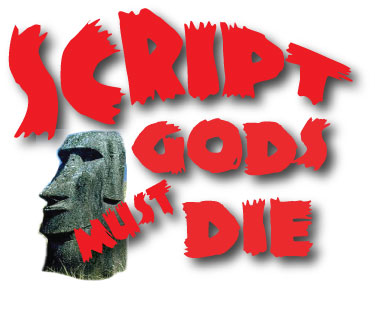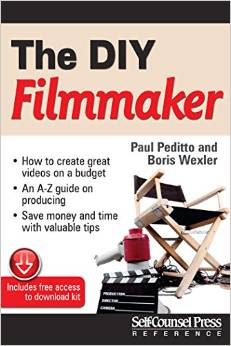“I am in the smallest room of my house. Your review is before me.
Soon it will be behind me.”—Max Reger

Paraphrasing here, when Samuel Beckett wrote of the ugliest word in the English language: “C-r-i-t-i-c”. Charles Bukowski once wrote me about this subject. I was complaining about a bad review. He told me: “You really mustn’t be angry. Anger is vindictive, small. Disgust is the holy water.”
It’s true. Anger is counter-productive. You really can’t take reviews personally, you know? Or get down with the constant drumbeat of rejection you’ll get when submitting your screenplay to screenplay contests, agents, and production companies. It’s part of the game. You’ve got to toughen up and expect it.
Fact: About reviews: If you believe them when they say you’re great, you have to believe them when they say you’re crap.

I’m of the opinion the truth probably lies somewhere in the middle. We’re talking about a subjective opinion formulated on a subjective work of art—a book, poem, movie. There is no science in this. With the amount of time you spend on a project, it’s easy to see how things can get personal should the reviewer not see your 25K micro-budget opus as the next Casablanca.
And in the grand scheme of time, how much of this actually matters?
I’ve got a garbage bag in the attic filled with reviews from my playwright days. Haven’t looked at them in years. In the age of digital storage, yes, you can still see a few of them, good and bad. The first review I ever got was from the Chicago Reader critic Lenny Kleinfeld. He was talking about the play that ultimately became my movie Jane Doe. This was an deeply autobiographical portrait of my girlfriend who died of a drug overdose. Lenny wrote: “He’ll just keep fucking her until her suicide is complete.” People worried I’d take it badly, but it kinda amused me. We got some nice reviews on that one too, including the Chicago Tribune who said “(the writing) plays like Raymond Chandler crossed with Jack Kerouac.”
So how am I supposed to feel? That I’m the next Jack Kerouac? Or that I totally blew it?

Approach criticism with as much detachment as possible. Try to find a thread or two of truth, something you can learn, something that can help you for the next project. But holding it up as the ultimate valuation of your efforts? Absurd. Don’t do it.
Critics can get it right. Have you looked at the reviews of Roger Ebert? Go to the Ebert website and read the archives, it’s an education on movie-making. Critics can get it right. They can also get it very, very wrong.
Here are a couple books and movies you may have heard of, and the reviews that accompanied them:
“What has never been alive cannot very well go on living. So this is a book of the season only…” –New York Herald Tribune, 1925, on The Great Gatsby by F. Scott Fitzgerald
“Whitman is as unacquainted with art as a hog is with mathematics.” –The London Critic, 1855, on Leaves of Grass by Walt Whitman
[Lawrence of Arabia] is, in the last analysis, just a huge, thundering camel-opera that tends to run down rather badly as it rolls on into its third hour and gets involved with sullen disillusion and political deceit.—Bosley Crowther, New York Times, December 1962
“[The Deer Hunter is] a disgusting account of what the evil Vietnamese did to poor, innocent Americans stands at the center of this Oscar-laden weepie about macho buddies from a small industrial town (Robert De Niro, Christopher Walken, John Savage, and John Cazale, wasted in his last screen performance).”—Jonathan Rosenbaum, Chicago Reader, Date Unknown
“The only remarkable thing about Francis Ford Coppola’s The Godfather, Part II is the insistent manner in which it recalls how much better his original film was…Part II, also written by Mr. Coppola and Mario Puzo, is not a sequel in any engaging way. It’s not really much of anything that can be easily defined.”—Vincent Canby, New York Times, December 1974
If Francis Ford Coppola can get panned, so can you. You can’t control the review or reviewer. You can’t control the rejection you’re likely to get from agents, screenwriting contests, and production companies.
You can only control your reaction.
Don’t believe them when they tell you you’re Kerouac, or when they say your movie was lousy. Glean what truth you can, flush the rest.


Comment *Rejection and Comedy go hand in hand.
Chicagoan here with a Comedy script looking for feedback.
The Last Chance 107 pgs
Logline:
An aging rock band finds success with the help of an autistic teen TikTok star, a female trucker and a sex worker. They must navigate relationships, mental health, addictions and family to finally achieve their moment in the spotlight.
Accessible on Coverfly last 2 read were 5/5 and 4.5/5 scores.
Itsaboy55@gmail.com
Logline seems tight, though you spread the net out wide. I thought it might be
a generational comedy with a social statement(TikTok gen vs Boomers) but then
you added in the female trucker and sex worker so I’m not sure what it is.
Any protagonist? Got a full band to develop plus the other 3. See what I mean
about spreading the net wide?